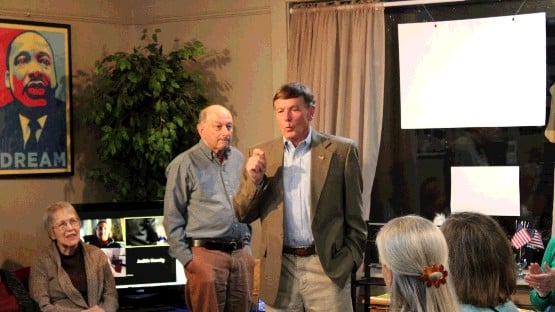
I’m more embarrassed that people who I would otherwise consider political and philosophical fellow travelers are defending these actions as being somehow legitimate expressions of political and civil protest.
What we saw Monday night in Baltimore wasn’t political protest, it wasn’t some grandiose expression of hopelessness; it was petulant, childish, brutish anger, and in no way should it be ennobled as being anything more.
There are legitimate criticisms to be lodged specifically at policing tactics in Baltimore and generally at the mission creep in the direction of police-state status in communities nationwide.
Burning down the liquor store on the corner is not a proper way to raise those criticisms.
Trying to reframe lawlessness as legitimate protest only does a disservice to the concept of agitation for the redress of grievances. Freddie Gray is dead, and it seems pretty clear that his death is the result of heavy-handed, and criminal, police tactics. It is human nature to have anger over how he died, and how police in Baltimore have similarly treated other suspects in their custody, and to express that anger in myriad ways.
It had seemed for the first few days after the death of Gray that the expression of anger was being channeled in such a way as to focus attention on the policing tactics, which is where the focus of attention needs to be.
Now it’s on the actions of a relative few who have seized the day to focus attention on themselves.
We’re not hearing from the looters directly, but we’re hearing plenty from their apologists, who have been quick to cast the looting and wanton destruction as a crude sort of political statement.
It’s poor folks telling us they’re fed up, we’re being told, by people who only know what poor folks are thinking because they read about what poor people go through in a book.
As someone with personal experience being poor, growing up in a single-parent household, in a trailer park, food stamps and free school lunches and the rest, I can tell you how at least one poor kid growing up viewed the world.
See, hope isn’t something that somebody gives you. Hope is something you have to create for yourself.
I can’t give you hope; you have to want it. Hope has to come from within.
It’s not somebody else’s fault, not the government’s fault, if you feel hopeless. That’s on you.
You’re not disenfranchised if you do it to yourself. You’re disengaged. That’s also on you.
Disengaged, willfully hopeless, then angry and lashing out … at others. And we’re ennobling this as legitimate political expression.
We’re patting people on the head and telling them it’s OK to break stuff because they’re mad at their self-imposed hopelessness.
A better use of that energy is empowering people to want more from and for themselves.
I woke up Monday morning a liberal Democrat. I went to bed … not sure, but not what I woke up.
We’ve created a culture of dependency that is going to be hard for us to re-engineer into something more constructive.
And we’re not going to get anywhere near the roots of the problem, much less getting to solving it, if we ignore the role that failed social policies play in fostering the sense of hopelessness that we’re being told is the flashpoint in Baltimore.
If what you feel you can aspire to is a life in the projects making minimum wage when you’re not on welfare, hell, yeah, burn the motherfucker down, I get that, a lot of us get that, we should all get that.
But there’s little any of us can do to make you feel hope, to want more for yourself, because you have at your disposal the means for creating that hope, the only limits to which are your own imagination and willingness to work for it.
There’s no safety net that we can build that can make you want better for yourself.
Again, that’s on you.
– Column by Chris Graham










